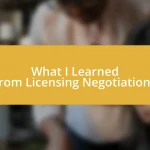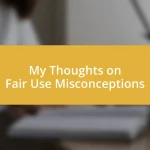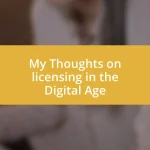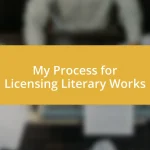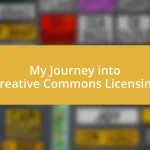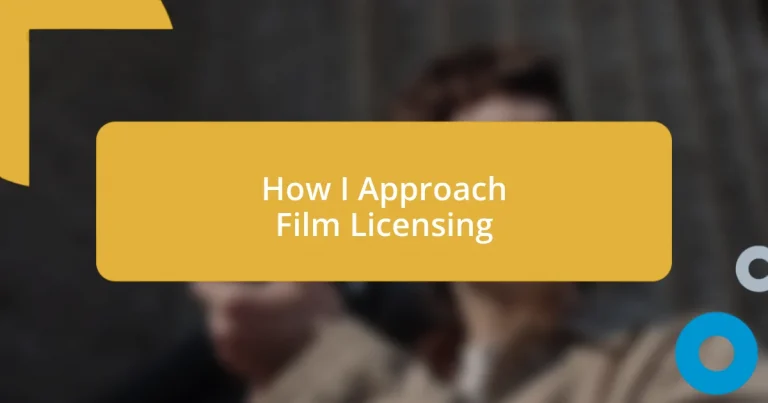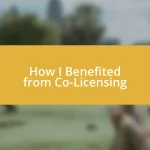Key takeaways:
- Understanding film licensing not only provides legal protection but also enhances credibility and opens networking opportunities within the industry.
- Researching licensing requirements is essential, including knowing the specific type of license needed, regional regulations, and keeping documentation organized.
- Successful promotion of licensed content involves strategic social media use, collaboration with influencers, and evaluating measurable outcomes to refine future efforts.
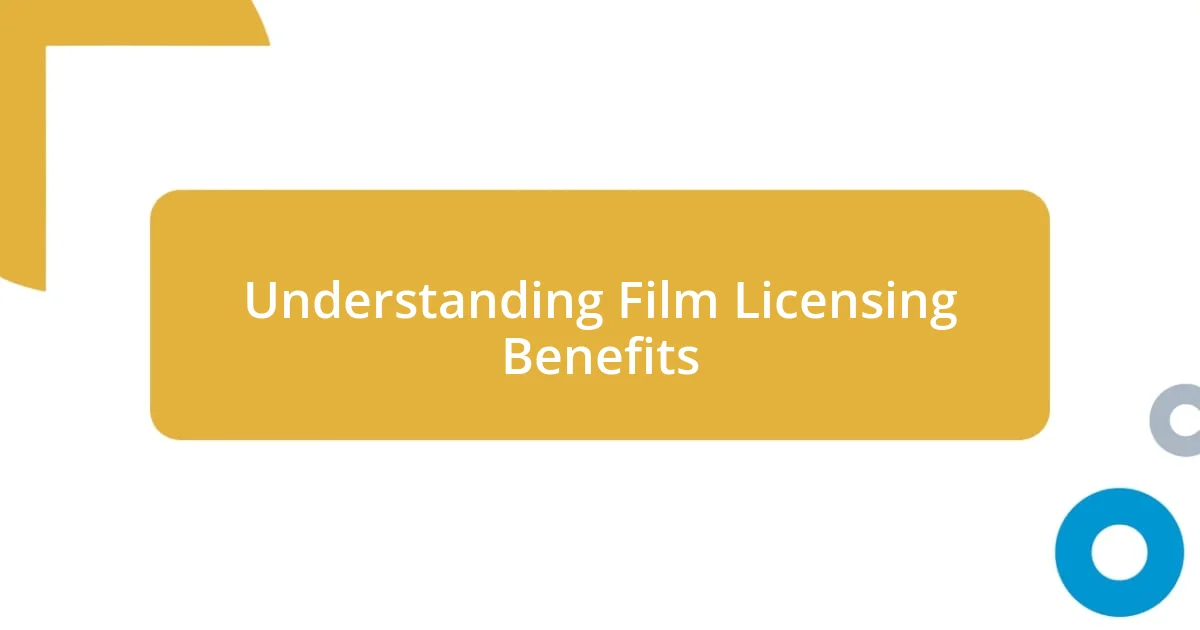
Understanding Film Licensing Benefits
Understanding the benefits of film licensing can open doors that you might not even realize exist. I remember the first time I secured a license for a short film—what a game changer! It wasn’t just about legality; it felt like a validation of my work and creativity.
When you license your film, you’re not only ensuring you’re on the right side of the law, but you’re also gaining credibility. Imagine being able to showcase your work at a festival without worrying about infringement claims—that peace of mind is invaluable. Have you ever felt that anxiety about whether your content is protected? Trust me, having a licensing agreement eases that weight significantly.
Moreover, film licensing can lead to unexpected opportunities. For instance, I once discovered a collaborative project because a distributor was impressed by my licensed work. It made me realize that licensing isn’t just a checkbox—it’s a pathway to connections and growth in the industry! What possibilities could open up for you when you embrace this aspect of filmmaking?
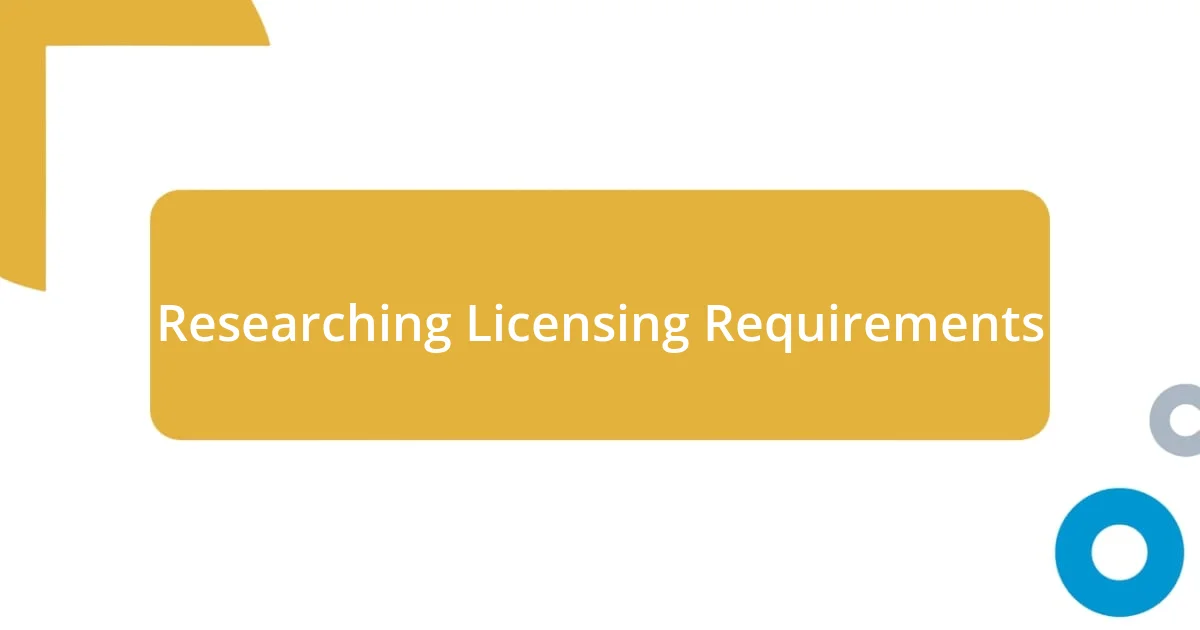
Researching Licensing Requirements
Researching licensing requirements is a crucial step in the filmmaking process. I always start by identifying the specific type of license I need, whether it’s for music, footage, or even talent. Each has its own set of regulations. The last time I navigated this terrain, I remember sifting through multiple websites to find the right guidance. It was overwhelming at first, but I felt a sense of accomplishment as I pieced together the necessary information.
As I dug deeper, I discovered that different regions and countries can have varying licensing rules. For example, when I was preparing for an international festival, I was amazed to learn how much the licensing landscape changed just by crossing a border. By reaching out to local film commissions, I uncovered valuable insights that streamlined the process. Have you ever wondered how a simple inquiry could lead to clarity? It truly transforms the way you approach your project’s licensing needs.
Lastly, it’s essential to keep your paperwork organized. I often create a checklist to gather all the documentation needed for licensing agreements. This not only helps me stay on track but also prevents last-minute stress. The peace of mind that comes from having everything in order—well, it’s worth its weight in gold. Wouldn’t you agree that being prepared makes the entire filmmaking journey far more enjoyable?
| Licensing Aspect | Considerations |
|---|---|
| Type of License | Research specific requirements based on film content |
| Geographic Location | Be aware of different regulations in various regions |
| Documentation | Maintain a checklist to streamline the licensing process |
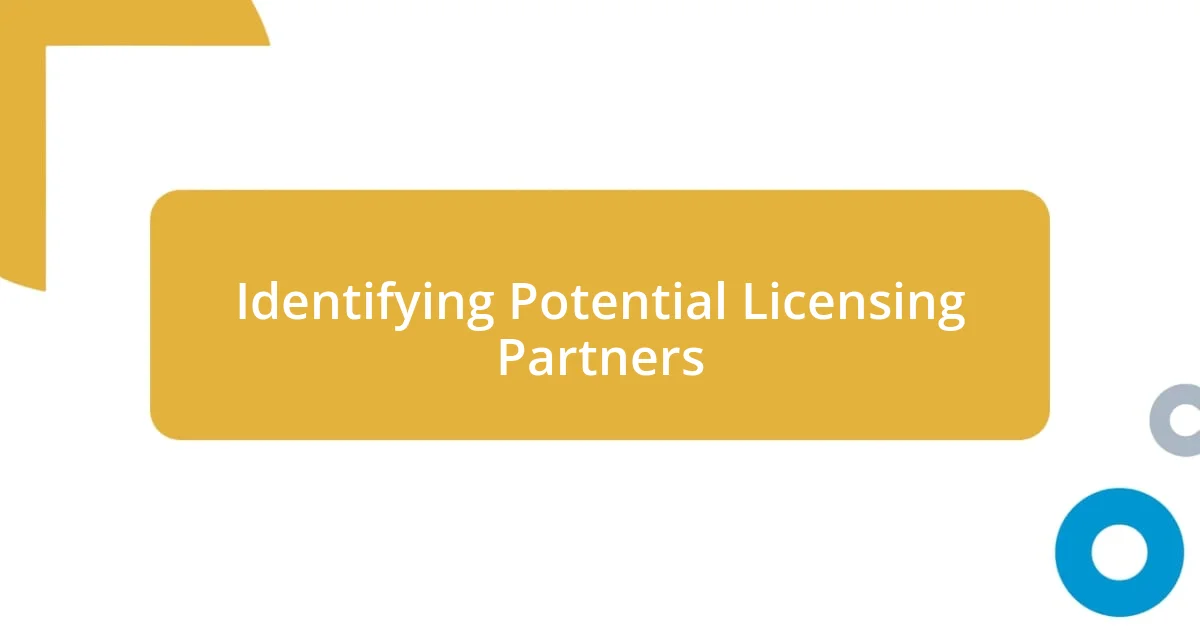
Identifying Potential Licensing Partners
Identifying potential licensing partners is a task that often begins with a solid understanding of your own film’s audience and market. I’ve learned that targeting the right partners can significantly amplify your reach. One time, I stumbled upon a local distributor that specialized in indie films, which perfectly aligned with my project. Their commitment to promoting up-and-coming filmmakers not only increased my film’s visibility but also created a supportive network of fellow creators. It’s fascinating how the right partnership can reveal new pathways for growth.
When searching for these partners, focus on a few key criteria to guide your process:
- Reputation: Look for companies known for fair treatment and ethical practices in licensing.
- Alignment: Ensure their mission aligns with your film’s themes and target audience.
- Network: Consider their connections within the industry; more connections can mean more opportunities.
- Innovation: Seek partners who are open to new ideas and collaborative approaches.
- Past Successes: Research their previous projects to see if they have a history of successful licensing deals.
Every licensing partner I’ve worked with has shaped my journey in unique ways. It’s a reminder that building these relationships isn’t just transactional; it’s about finding allies in the ever-evolving landscape of film.
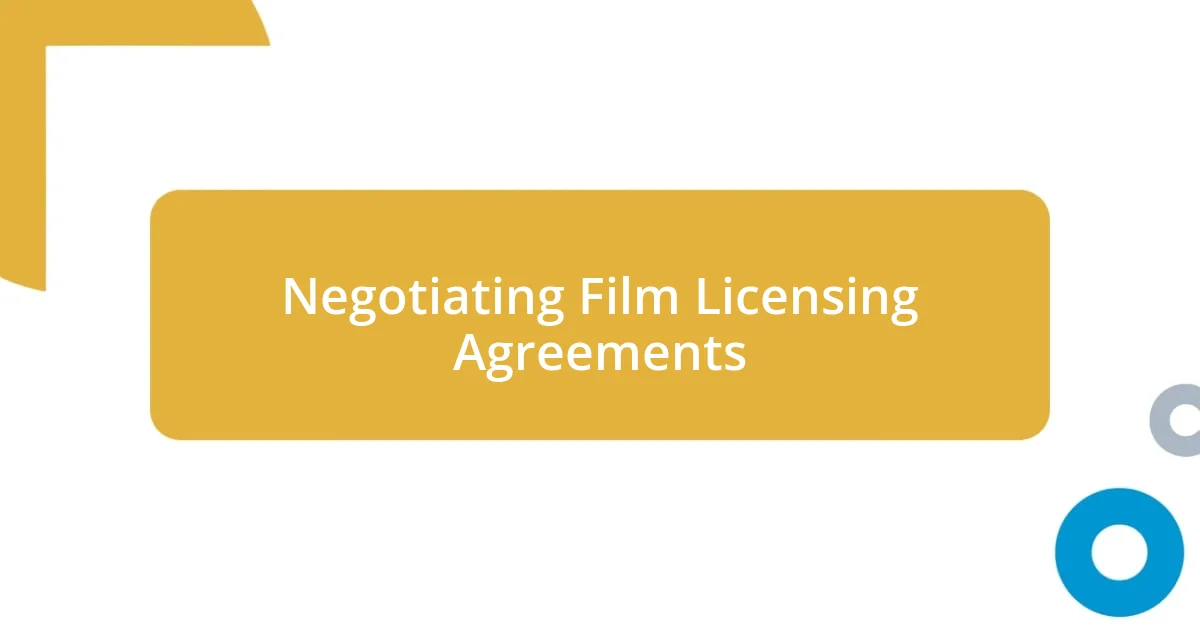
Negotiating Film Licensing Agreements
Negotiating film licensing agreements is where the real magic happens. I recall a time when I was discussing terms for a music license, and I felt a wave of nerves wash over me. But then, I reminded myself of the value I was bringing to the table. By approaching those discussions not just as a formality but as an opportunity for collaboration, I turned the conversation into a meaningful dialogue. Finding common ground helps in building relationships that go beyond just the license itself.
One crucial aspect of negotiation I always keep in mind is clarity. I once encountered a situation where ambiguity in terms led to misunderstandings later on. By ensuring that both parties were on the same page regarding usage rights and restrictions upfront, I avoided what could have been a costly mistake. Have you ever navigated a deal that felt slippery because of vague language? The clearer you are, the smoother the process becomes.
I also believe that flexibility can be a game changer. In another instance, I negotiated a deal involving footage rights and, surprisingly, the other party was willing to adjust their pricing based on the project’s budget constraints. This willingness to find a middle ground not only secured the footage I needed but also fostered a spirit of teamwork. Isn’t it fascinating how a little flexibility can transform a potentially challenging negotiation into a win-win situation?
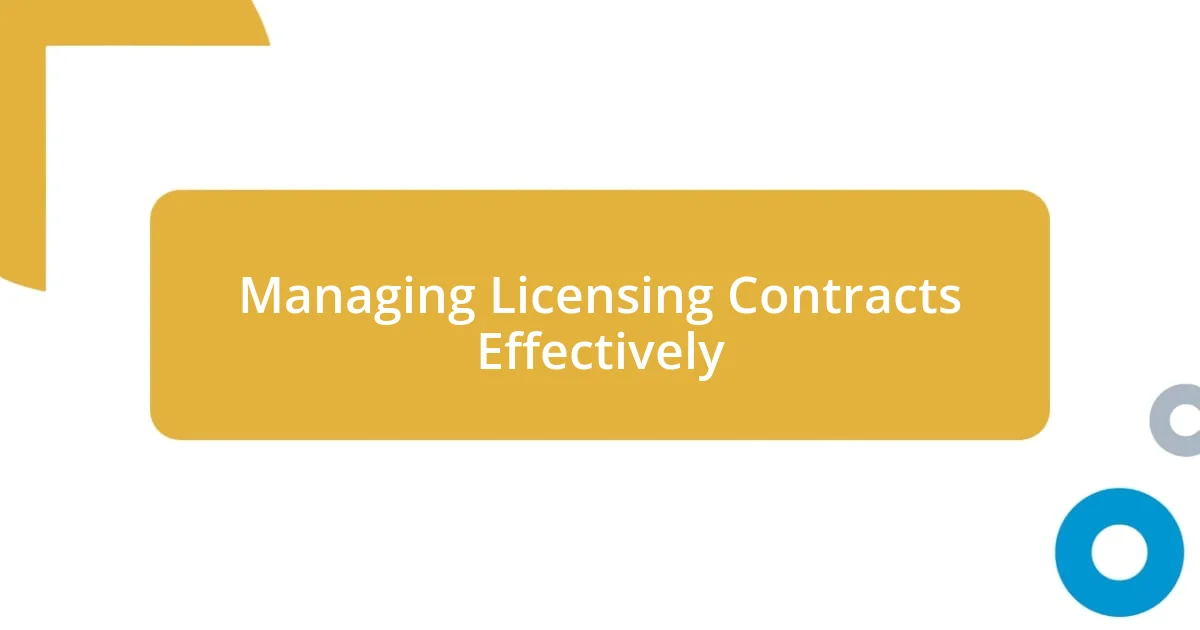
Managing Licensing Contracts Effectively
Managing licensing contracts effectively requires a keen eye for detail and solid organization. I remember a time when I was overwhelmed by the sheer number of documents and deadlines involved in multiple contracts. To tackle this, I started using a project management tool to create an overview of each agreement, highlighting important dates and obligations. Is there any better feeling than knowing exactly where you stand with every licensing deal? This clarity not only kept me on track but also made communication with partners much smoother.
I’ve found that regular check-ins with all parties involved can make a significant difference. In one situation, I reached out to a licensing partner for a casual follow-up, and we ended up discussing potential expansions of our agreement. It was exciting to uncover new opportunities simply by maintaining an open dialogue. Have you ever missed a great chance just because you hadn’t talked to someone in a while? Staying proactive in communication can lead to unexpected and beneficial turns in your licensing journey.
Additionally, I never underestimate the importance of having a legal expert review contracts before finalization. There was a time when I overlooked a seemingly minor clause that had major implications down the line. I learned then that a second pair of eyes can catch nuances I might miss, potentially saving me from costly errors. It’s a small investment for peace of mind, don’t you think? In the end, effective management of licensing contracts isn’t just about keeping things organized—it’s about fostering relationships and seizing opportunities that arise from a well-maintained partnership.
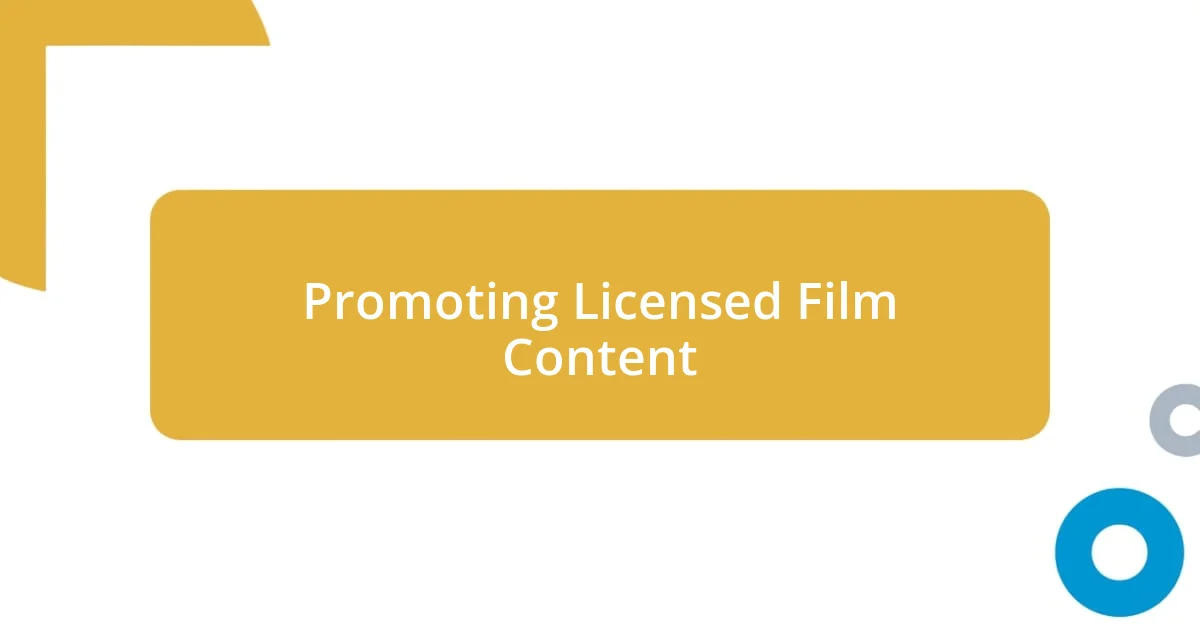
Promoting Licensed Film Content
Promoting licensed film content is a delicate dance of creativity and strategy. I recall a time when I was tasked with launching a promotional campaign for a documentary I had licensed. By tailoring our messaging to highlight the film’s unique narrative and community impact, we engaged potential audiences on an emotional level. Have you ever noticed how stories resonate more when they connect with people’s experiences? Focusing on relational aspects can really amplify interest and viewership.
One key takeaway from my experiences in promoting licensed content is the importance of utilizing social media effectively. I once experimented with various platforms for a film release and found that behind-the-scenes content sparked more engagement than traditional trailers. It was invigorating to see how authenticity encourages people to share and discuss—doesn’t it feel good when your content creates buzz? Engaging audiences through personal stories and interactive posts can turn passive viewers into enthusiastic advocates for the film.
Collaboration with influencers has also transformed my approach to promotion. I remember collaborating with a local filmmaker and leveraging their audience to reach wider demographics. The synergy created a genuine buzz, and it was gratifying to see how partnerships could extend the film’s reach beyond our initial expectations. Have you ever thought about how powerful collaboration can be in advancing your message? It’s all about building relationships that foster growth and excitement for the licensed content—and who wouldn’t want to be part of that vibrant experience?
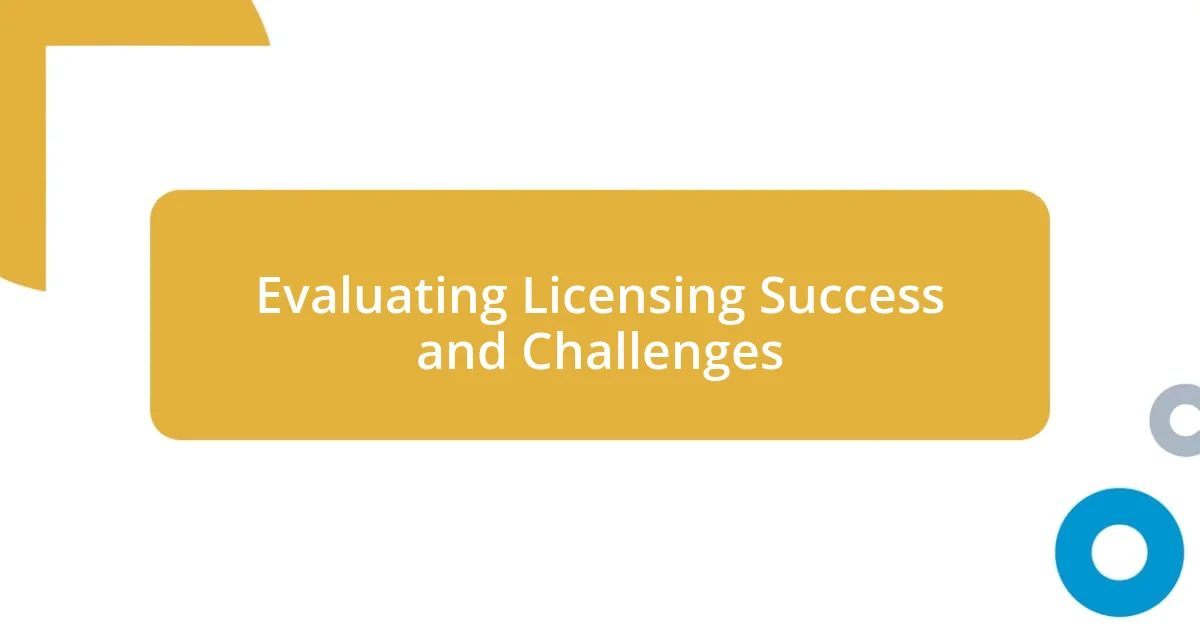
Evaluating Licensing Success and Challenges
Evaluating the success of licensing agreements truly hinges on measurable outcomes. I often reflect on a film I licensed where we tracked viewer engagement metrics post-release. Seeing those numbers climb was exhilarating, but it was equally insightful to analyze why certain elements worked and others didn’t. Have you ever celebrated a win only to realize there’s much more beneath the surface? It made me appreciate the necessity of continuous evaluation.
On the flip side, challenges are an inevitable part of the licensing landscape. I recall a situation where unexpected financial hurdles disrupted our partnership, forcing me to quickly pivot our strategy. That experience taught me the importance of having contingency plans in place—essentially a safety net for all the risks we face. How often do we overlook potential obstacles when we’re riding high on success? Staying vigilant helps prepare for the curveballs that might come our way.
There’s a real art to balancing success with challenges in licensing. In one instance, a licensing deal fell through due to vague terms that were miscommunicated. Although it felt disheartening, it sparked a newfound dedication in me to clarify every detail next time. Isn’t it fascinating how failures can sometimes be the best teachers? Embracing those lessons ultimately enhances our approach, making future endeavors smoother and more fruitful.


